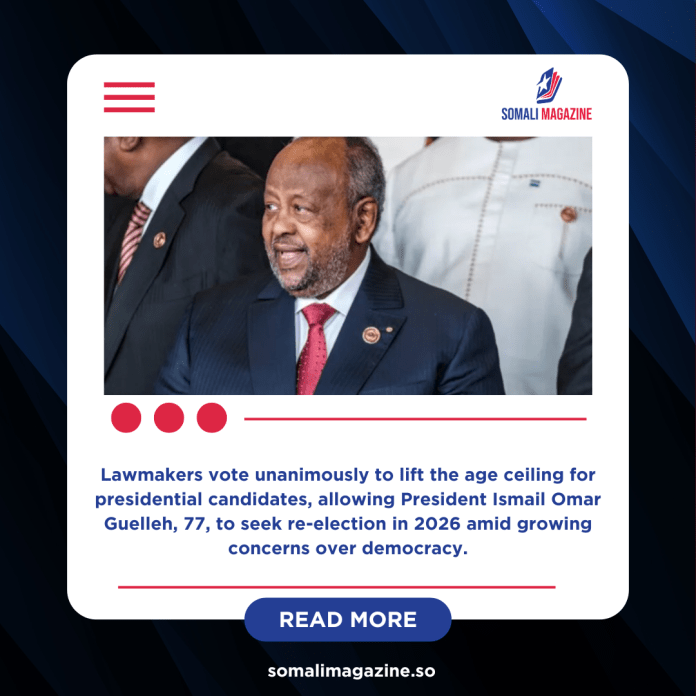Facebook Twitter (X) Instagram Somali Magazine - People's Magazine
Djibouti’s parliament has voted to remove the constitutional age limit for presidential candidates, clearing the way for President Ismail Omar Guelleh, 77, to run for a sixth term in office. All 65 lawmakers present supported the amendment, which eliminates the previous age cap of 75 years. The change still requires either approval from the president followed by a second parliamentary vote on November 2 or a national referendum before it becomes law.
Guelleh, commonly known by his initials IOG, has been in power since 1999, when he succeeded Djibouti’s founding president, Hassan Gouled Aptidon. Over the past two decades, he has maintained a strong grip on the country’s political system, often facing little opposition in elections. The 2010 constitutional reform, introduced under his leadership, abolished presidential term limits but shortened each term from six to five years. Now, with the removal of the age ceiling, Guelleh faces no major legal barrier to extending his rule further.
National Assembly Speaker Dileita Mohamed Dileita defended the decision, saying it was necessary to preserve stability in a volatile region. He claimed that over 80 percent of the public supports the change, although this figure could not be independently verified. Supporters of the amendment argue that Guelleh’s leadership has provided security and economic stability in a region plagued by conflict and instability, citing neighbouring Sudan’s ongoing war and Somalia’s internal divisions as examples.
Guelleh himself hinted earlier this year that he had no intention of stepping down. In an interview with Jeune Afrique magazine, he said, “I love my country too much to embark on an irresponsible adventure and be the cause of divisions.” His words were widely interpreted as a signal that he intends to continue governing beyond his current term, which ends in 2026.
However, critics have condemned the move as a major setback for democracy. Omar Ali Ewado, head of the Djiboutian League for Human Rights, described the amendment as “a step toward a presidency for life,” urging authorities to allow a peaceful and democratic transition of power. Opposition leader Daher Ahmed Farah from the Movement for Democratic Renewal and Development said that international partners should re-evaluate their support for Djibouti’s leadership. “The country’s strategic importance should benefit its people, not one man,” he told Al Jazeera.
Guelleh’s last re-election in 2021 saw him win over 98 percent of the vote after opposition groups boycotted the election, claiming it was neither free nor fair. At the time, the United States congratulated Djibouti on the peaceful election but urged the government to strengthen democratic processes and heed recommendations from international observers.
With his long rule, Guelleh now ranks among East Africa’s longest-serving leaders—third only to Uganda’s Yoweri Museveni and Eritrea’s Isaias Afwerki. Despite its population of just one million, Djibouti remains a key geopolitical player. Its location along the Bab al-Mandab Strait—a vital route for global trade between Asia and Europe—has made it a host for several foreign military bases, including those of the United States, France, China, Japan, and Italy.
This strategic importance has helped keep Djibouti relatively stable even as neighbouring countries experience unrest. But many fear that continued concentration of power in one individual could eventually threaten that same stability. Whether the constitutional changes will face serious public opposition or pass quietly remains to be seen, but for now, President Guelleh appears well-positioned to extend his rule beyond a quarter-century.

